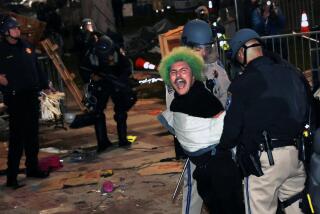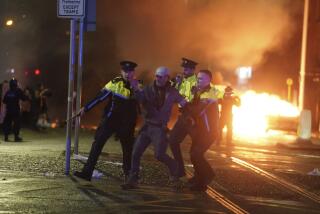Police Beat Albanians Protesting Killings
- Share via
PRISTINA, Yugoslavia — Cheered on by Serb onlookers, riot police used water cannons, tear gas and clubs Monday to chase away tens of thousands of ethnic Albanians gathered to protest the killings of their compatriots.
It was the third day of ethnic violence in Serbia’s Albanian-majority Kosovo province, raising fears of a broader conflict that could draw Balkan nations into new fighting.
Hundreds of police swung their way into the crowd, estimated at 30,000, beating the protesters as they ran into the side streets of Pristina, Kosovo’s provincial capital. Some demonstrators were left bleeding on the ground while Serbs waved to police from their windows, congratulating them on their swift action.
Television cameras caught one older man, his head bloodied, protesting, “I’m a professor, a professor at the university.”
Witnesses said 41 people were injured in Monday’s clash.
The melee followed a violent weekend in which Serbian police killed at least 14 Albanians in retaliation for an ambush that killed four police officers.
The growing ethnic violence alarmed international leaders. In Washington, State Department spokesman James P. Rubin condemned the violence and said the ranking U.S. diplomat in Belgrade, the capital of Serbia and Yugoslavia, has protested to authorities of both.
“The United States expects the Serbian police in Kosovo to act with maximum restraint,” Rubin said. He also said U.S. sanctions against Belgrade will remain in place until authorities there “have taken meaningful steps to address the legitimate grievances” of Kosovo’s Albanian community.
The European Union called for increased international pressure to push Yugoslav President Slobodan Milosevic into negotiating a peaceful solution to the crisis.
“If this problem expands into a military conflict, it will not remain within the boundaries of Kosovo,” warned Tito Petkovski, head of parliament in neighboring Macedonia, which has its own restive ethnic Albanian minority.
Kosovo Albanians, who make up more than 90% of the province’s 2 million people, have been pushing for independence from Serbia, which abolished the province’s broad autonomy in 1989.
More to Read
Sign up for Essential California
The most important California stories and recommendations in your inbox every morning.
You may occasionally receive promotional content from the Los Angeles Times.










